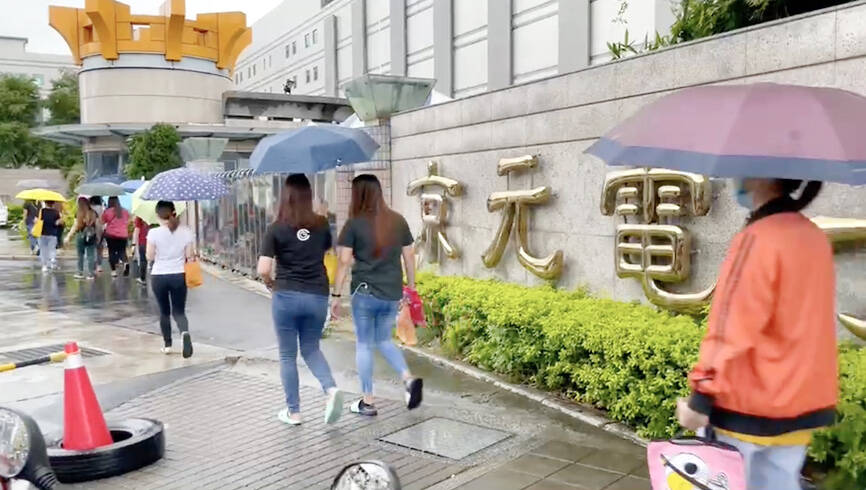Chip tester King Yuan Electronics Co (京元電子), which counts Nvidia Corp and Broadcom Inc among its customers, yesterday raised this year’s capital expenditure by 37 percent to a new record high of NT$37 billion (US$1.24 billion) from its previous estimate, to accelerate capacity expansion amid growing demand for artificial intelligence (AI) chips and customized application-specific ICs for AI applications.
It was the second hike by King Yuan this year from a NT$26.97 billion budget approved by its board of directors in May, according to a company filing with the Taiwan Stock Exchange yesterday.
On an annual basis, that represented a spike from NT$14.86 billion spent last year on new facilities and equipment.

Photo: CNA
The company in May also said it has acquired a new manufacturing facility for NT$327 million in Miaoli County’s Toufen Township (頭份) in a bid to expand high-end chip testing capacity.
In addition, King Yuan said the board has approved a new capital injection plan of S$100 million (US$77.8 million) for its Singaporean subsidiary, KYEC Singapore Pte Ltd, according to a separate company filing.
The new funding plan triggered speculation that King Yuan is mulling to build a new fab in the city-state amid growing geopolitical risks.
As part of the firm’s capacity expansion efforts, the board of directors yesterday also approved a plan to issue 80 million new shares via a rights issue to its existing shareholders to fund the purchases of new manufacturing equipment.
King Yuan yesterday reported that net profit soared 98 percent to NT$6.47 billion in the first half of this year, compared with NT$3.27 billion in the same period of last year.
That translated into earnings per share of NT$5.29 in the first half, up from NT$2.68 a year earlier.
Gross margin rose mildly to 34.56 percent from 34.19 percent.
Revenue expanded 25.34 percent year-on-year to NT$16.68 billion in the first half of this year, from NT$12.52 billion.
The company did not give the latest revenue breakdown, but company data showed that final test services was the biggest revenue contributor in the first quarter, accounting for 45.7 percent. Wafer probing services came next with a 37.2 percent share.

Nvidia Corp chief executive officer Jensen Huang (黃仁勳) on Monday introduced the company’s latest supercomputer platform, featuring six new chips made by Taiwan Semiconductor Manufacturing Co (TSMC, 台積電), saying that it is now “in full production.” “If Vera Rubin is going to be in time for this year, it must be in production by now, and so, today I can tell you that Vera Rubin is in full production,” Huang said during his keynote speech at CES in Las Vegas. The rollout of six concurrent chips for Vera Rubin — the company’s next-generation artificial intelligence (AI) computing platform — marks a strategic

REVENUE PERFORMANCE: Cloud and network products, and electronic components saw strong increases, while smart consumer electronics and computing products fell Hon Hai Precision Industry Co (鴻海精密) yesterday posted 26.51 percent quarterly growth in revenue for last quarter to NT$2.6 trillion (US$82.44 billion), the strongest on record for the period and above expectations, but the company forecast a slight revenue dip this quarter due to seasonal factors. On an annual basis, revenue last quarter grew 22.07 percent, the company said. Analysts on average estimated about NT$2.4 trillion increase. Hon Hai, which assembles servers for Nvidia Corp and iPhones for Apple Inc, is expanding its capacity in the US, adding artificial intelligence (AI) server production in Wisconsin and Texas, where it operates established campuses. This

US President Donald Trump on Friday blocked US photonics firm HieFo Corp’s US$3 million acquisition of assets in New Jersey-based aerospace and defense specialist Emcore Corp, citing national security and China-related concerns. In an order released by the White House, Trump said HieFo was “controlled by a citizen of the People’s Republic of China” and that its 2024 acquisition of Emcore’s businesses led the US president to believe that it might “take action that threatens to impair the national security of the United States.” The order did not name the person or detail Trump’s concerns. “The Transaction is hereby prohibited,”

Garment maker Makalot Industrial Co (聚陽) yesterday reported lower-than-expected fourth-quarter revenue of NT$7.93 billion (US$251.44 million), down 9.48 percent from NT$8.76 billion a year earlier. On a quarterly basis, revenue fell 10.83 percent from NT$8.89 billion, company data showed. The figure was also lower than market expectations of NT$8.05 billion, according to data compiled by Yuanta Securities Investment and Consulting Co (元大投顧), which had projected NT$8.22 billion. Makalot’s revenue this quarter would likely increase by a mid-teens percentage as the industry is entering its high season, Yuanta said. Overall, Makalot’s revenue last year totaled NT$34.43 billion, down 3.08 percent from its record NT$35.52